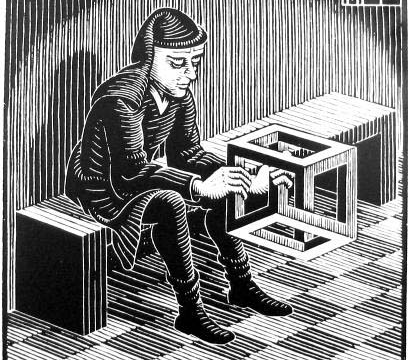
Summer Immersion July 2023
Formalization of Psychoanalytic Theory
Developed in 4 moments, our title gives rise to:
1.Ø Concepts of psychoanalysis and their topologization.
Here are the key words:
- significance, signifiers, signifying network…
- modalities, intension, extensions,
- recursion, impredicativity, predicativity.
2.Ø Asphericity and sphericity:
- Moebius strip, projective plane,
- Boy's cross-cap and surface,
- borro-projective scheme.
3.Ø Nodality, borromeanization, nodes:
- 'outside' viewpoint
- from the Borromean knot to the modal square,
- Freud's "clinical" choices,
- those of Lacan.
-
4.Ø Philosophy of mathematics and logic:
- choice of dimensions in play,
- structure of chaos,
- poetics of the treatment and the pass.
Argument of René Lew for the Summer Immersion of July 2023
How does the formalization of psychoanalytic theory help practice psychoanalysis?
Psychoanalysis since Freud, and more expressly with Lacan, relates the unconscious to language. However, psychoanalysis bases its practice on a non-linguistic conception of language. This conception is all the better defined and grasped when its structure is specified in terms of the logic of the signifier and the topology of the subject coordinated with each other. There is, therefore, nothing in the psychoanalytic act that is not based on language. provided that it is approached in a non-standard way, without however leaving aside the classical logic nevertheless integrated into those logics Quine calls 'deviant'. Our approach begins in four steps, without a magisterial presentation, and if possible in a dialogue (questions and answers, remarks, criticisms, etc.) with the audience. All preliminary questions and all subsequent follow-ups are welcome. A clarification: a signifier in psychoanalysis is defined and behaves like a point in general topology: it is above all a matter of proximity.
Schedule
R. Lew's intervention will take place on Saturday and Sunday, July 1st and 2nd, from 10:00 am-12:30 pm PST via Zoom. It will meet again the next weekend, on the 8th and 9th, at the same time PST. The presentation will be in French and simultaneously translated by an interpreter. The last two weekends of July, the same times, will be presented by R.T. Groome and A. Lotfalian, and dedicated to Non-classical logics (modal, intuitionist, bi-intuitionist) and their use in the context of Lacanian analysis. A bridge to Heyting & Bi-Heyting Algebras and Galois Groups will also be included. No previous background is required. All of these meetings will be held via Zoom. If you wish to be included in the Immersion, you can contact the secretary of PLACE for the Zoom code. It is free for all first-time auditors.
Bio of René Lew
Psychiatrist by training, René Lew, has always worked as a psychoanalyst, both in private practice and in institutions, including as a hospital practitioner and in the support of his colleagues. He practices with children, adolescents and adults. He was medical director of the Medical-Psycho-Pedagogical Center of Ivry-sur-Seine for 35 years, and at the same time he developed his practice at the Esquirol Hospital in Saint-Maurice (formerly Charenton) for 47 years. Currently, he works in the Medical-Educational Institute for young people with autism. He is interested in philosophy, logic, mathematics, physics, literature and art in their links with psychoanalysis. Since 1981 he has directed several seminars, the last of which have as general theme “The commitment of psychoanalysis”. He created the journal Cahiers de lectures freudiennes as well as the Association de la Lysimaque in 1982, which continues today in the publication of numerous books, as well as in the organization of conferences and seminars. With a few colleagues, he founded the association Dimensions of Psychoanalysis in 1994, which promotes various activities in collaboration with other associations, including the different methods of training psychoanalysts (cartels, seminars, passes, etc.). Dimensions of Psychoanalysis is a member of Convergencia, Lacanian Movement for Freudian Psychoanalysis, which brings together multiple Latin American and European psychoanalytical associations. He has written numerous articles and presents regularly each year at colloquiums and other academic events. In 2014 he started publishing his works.